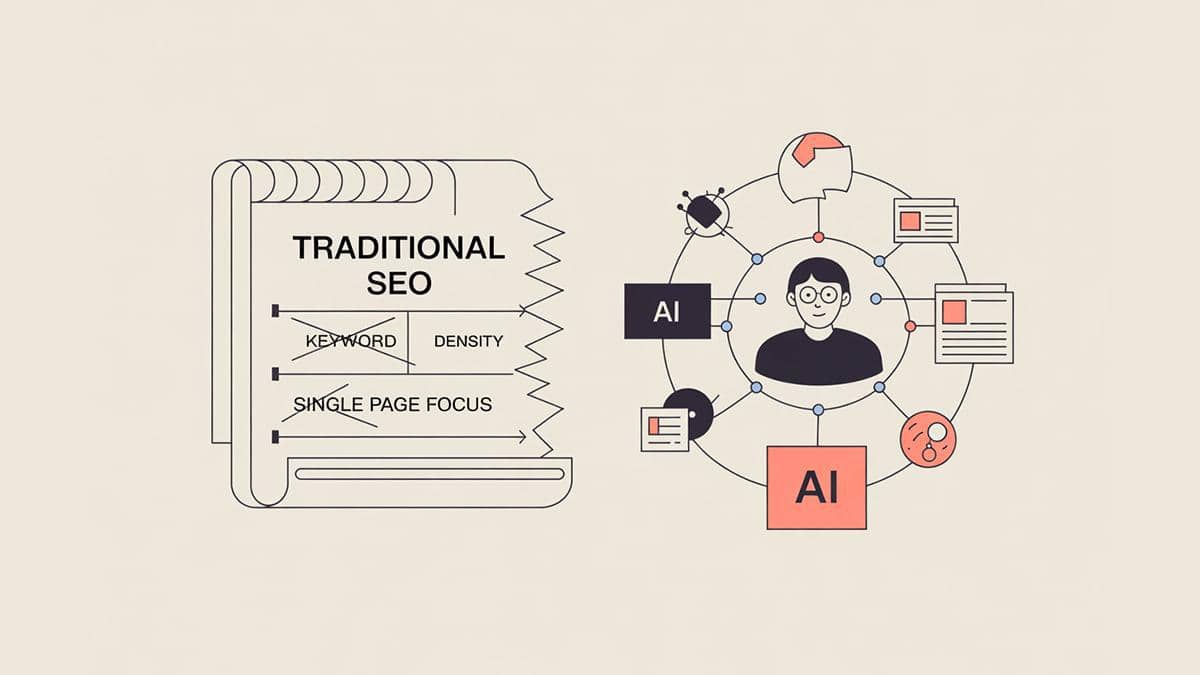Why AI Content Creators Fail at SEO: 5 Fixes That Actually Work

Your AI content strategy is producing more content than ever, so why isn’t your organic traffic growing? Despite having access to powerful AI tools like StoryLab.ai that can generate unlimited content at lightning speed, many content creators and marketing teams are discovering a harsh reality: more content doesn’t automatically equal better SEO results.
The problem isn’t your AI tools. The problem is that most content creators are using AI to solve the wrong SEO challenges while ignoring the strategic foundations that actually drive search success. According to recent data from SE Ranking, 68% of marketers report that their content volumes increased significantly with AI adoption, yet only 23% saw corresponding improvements in organic rankings.
For content creators who’ve invested in AI-powered workflows, this disconnect between content production and search performance represents a massive missed opportunity. The solution isn’t to create more content, it’s to understand what modern SEO actually requires and how to align your AI content strategy with ranking factors that matter in 2025.
Chapters
- The content volume trap that’s killing your SEO
- Why traditional SEO advice fails AI content creators
- The technical foundation most content creators ignore
- The content strategy that actually works with AI
- Measuring what matters in AI content success
- The future of AI-powered content strategy
- Bottom line
The content volume trap that’s killing your SEO

AI has made it ridiculously easy to publish content, but Google’s algorithm has responded by becoming more selective about what deserves to rank. The March 2025 core update specifically targeted sites with high-volume, low-value content, creating the highest SERP volatility rates on record.
Content creators who embraced AI tools to increase their publishing frequency discovered that quantity without strategic focus actually hurt their rankings. Google’s E-E-A-T framework (Experience, Expertise, Authoritativeness, Trustworthiness) now prioritizes content that demonstrates genuine expertise over content that simply targets keywords.
The numbers tell the story clearly. HubSpot’s 2024 research reveals that 67% of content marketers struggle with creating content that both ranks well and engages audiences. The core issue? They’re using AI to optimize for search engines rather than users, missing Google’s fundamental shift toward user-centric ranking factors.
This creates a paradox for content creators: AI tools excel at producing technically optimized content, but they struggle with the contextual expertise and authentic voice that modern search algorithms reward. The solution requires treating AI as a productivity enhancer rather than a strategy replacement.
Smart content creators are learning to use AI for ideation, research, and first drafts while maintaining human oversight for expertise, strategic focus, and authentic brand voice—the elements that actually influence search rankings.
Why traditional SEO advice fails AI content creators

Most SEO guidance assumes you’re creating content manually, one piece at a time. Traditional approaches focus on keyword density, meta descriptions, and technical optimization—tactics that become irrelevant when you’re publishing multiple pieces daily using AI tools.
The conventional SEO playbook also assumes you have limited content production capacity, leading to advice about targeting high-volume keywords and competing for difficult search terms. But AI content creators can target hundreds of long-tail keywords across comprehensive topic clusters—if they understand how to structure their content strategy properly.
Traditional agencies compound this problem with outdated advice. Many Singapore SEO providers still recommend creating 500-800 word blog posts optimized for single keywords, completely missing how AI-powered content strategies should work. They focus on ranking individual pages rather than building topical authority across entire content ecosystems.
The biggest disconnect comes from measurement approaches. Traditional SEO focuses on tracking keyword rankings for specific pages, while AI content strategies require understanding how content clusters work together to build domain authority and capture traffic across multiple search queries.
For content creators using AI tools, success requires abandoning traditional “one page, one keyword” thinking in favor of comprehensive topic coverage that demonstrates expertise across their entire subject area.
The technical foundation most content creators ignore
Your AI content strategy is only as strong as your technical SEO foundation. While content creators focus on using AI to produce more blog posts and social media content, they often overlook the technical elements that determine whether their content can actually rank.
According to Statista, 59.16% of global web traffic now comes from mobile devices, making mobile optimization absolutely critical for content success. Yet many AI-powered content sites fail basic mobile usability tests, suffering from slow loading times, poor responsive design, and navigation issues that kill user experience.
Core Web Vitals have become direct ranking factors, meaning your content’s technical performance directly impacts its search visibility. Sites that load in under 3 seconds and provide smooth interaction experiences consistently outperform technically inferior content, regardless of content quality.
The challenge for AI content creators is that technical optimization requires different expertise than content creation. Many teams excel at using AI for content production but struggle with performance optimization, structured data implementation, and user experience improvements.
This technical gap becomes more critical as content volume increases. Publishing hundreds of AI-generated pieces without proper technical foundations can actually harm your overall domain performance, creating a site-wide penalty that affects all your content’s ranking potential.
Smart content creators invest in technical excellence as a prerequisite for content success, ensuring their AI-powered content strategy is built on foundations that can support sustained growth.
The content strategy that actually works with AI

Effective AI content strategies focus on building topical authority rather than targeting individual keywords. Instead of using AI to create random blog posts about trending topics, successful content creators use AI to develop comprehensive coverage of their expertise areas.
This approach requires understanding your audience’s complete customer journey and creating content that serves every stage of their decision-making process. AI tools excel at identifying content gaps and generating ideas for comprehensive topic coverage, but they need strategic direction about what topics actually matter for your business goals.
The most successful AI content creators follow a hub-and-spoke model. They create authoritative pillar content that covers broad topics comprehensively, then use AI to generate supporting content that addresses specific questions and use cases related to those main topics.
For example, instead of creating random marketing tips, a content creator might build comprehensive guides about content strategy, then use AI to generate specific how-to articles, case studies, and tool reviews that link back to and support those main resources.
This strategy works because it aligns with how Google evaluates expertise. Rather than trying to rank for competitive keywords with individual posts, you’re building a content ecosystem that demonstrates deep knowledge across your entire field.
Quality content creators understand that AI is most effective when used strategically. Companies like Digitrio represent this evolution by using AI as part of comprehensive SEO strategies that prioritize user experience and authentic expertise over simple content volume.
Measuring what matters in AI content success
Traditional SEO metrics become misleading when you’re publishing AI-generated content at scale. Tracking individual keyword rankings makes little sense when you’re targeting hundreds of long-tail search queries across topic clusters.
Instead, successful AI content creators focus on business-outcome metrics: qualified traffic growth, engagement rates, conversion performance, and overall domain authority improvement. These metrics better reflect whether your content strategy is actually driving business results.
The key insight is understanding attribution in AI content strategies. Unlike traditional approaches where you can track specific pages to specific business outcomes, AI content strategies work through collective impact. Your conversion might come from someone who discovered you through one piece of content but converted after consuming multiple related pieces.
According to First Page Sage research, content strategies focused on building comprehensive expertise deliver 748% ROI compared to 16% for basic keyword targeting approaches. The difference comes from building sustained authority that compounds over time.
For content creators using AI tools, success requires patience and strategic focus rather than expecting immediate returns from individual content pieces. The goal is building a content ecosystem that becomes increasingly valuable and authoritative over time.
The future of AI-powered content strategy

The content creators who succeed with AI will be those who understand it’s not about replacing human strategy but about amplifying human expertise. AI handles the production bottlenecks that previously limited content creation, but human insight drives the strategic decisions that determine content success.
This means using AI to execute comprehensive content strategies rather than random content production. Smart content creators use AI to research topics, generate outlines, create first drafts, and optimize technical elements while maintaining human oversight for strategic direction, expertise validation, and brand voice consistency.
The opportunity is massive for content creators who get this balance right. With SE Ranking data showing that SEO drives 1000% more traffic than organic social media, content creators with effective AI-powered SEO strategies can achieve unprecedented scale and impact.
The future belongs to content creators who treat AI as a powerful productivity tool within comprehensive content strategies, not as a replacement for strategic thinking about what their audiences actually need and how search engines evaluate content quality.
Bottom line
Your AI tools are only as effective as the SEO strategy behind them. Master the strategic foundations, and AI becomes a multiplier for sustainable content success.
Other Interesting Articles
Master the Art of Video Marketing
AI-Powered Tools to Ideate, Optimize, and Amplify!
- Spark Creativity: Unleash the most effective video ideas, scripts, and engaging hooks with our AI Generators.
- Optimize Instantly: Elevate your YouTube presence by optimizing video Titles, Descriptions, and Tags in seconds.
- Amplify Your Reach: Effortlessly craft social media, email, and ad copy to maximize your video’s impact.
The post Why AI Content Creators Fail at SEO: 5 Fixes That Actually Work appeared first on StoryLab.ai.


Deixe um comentário